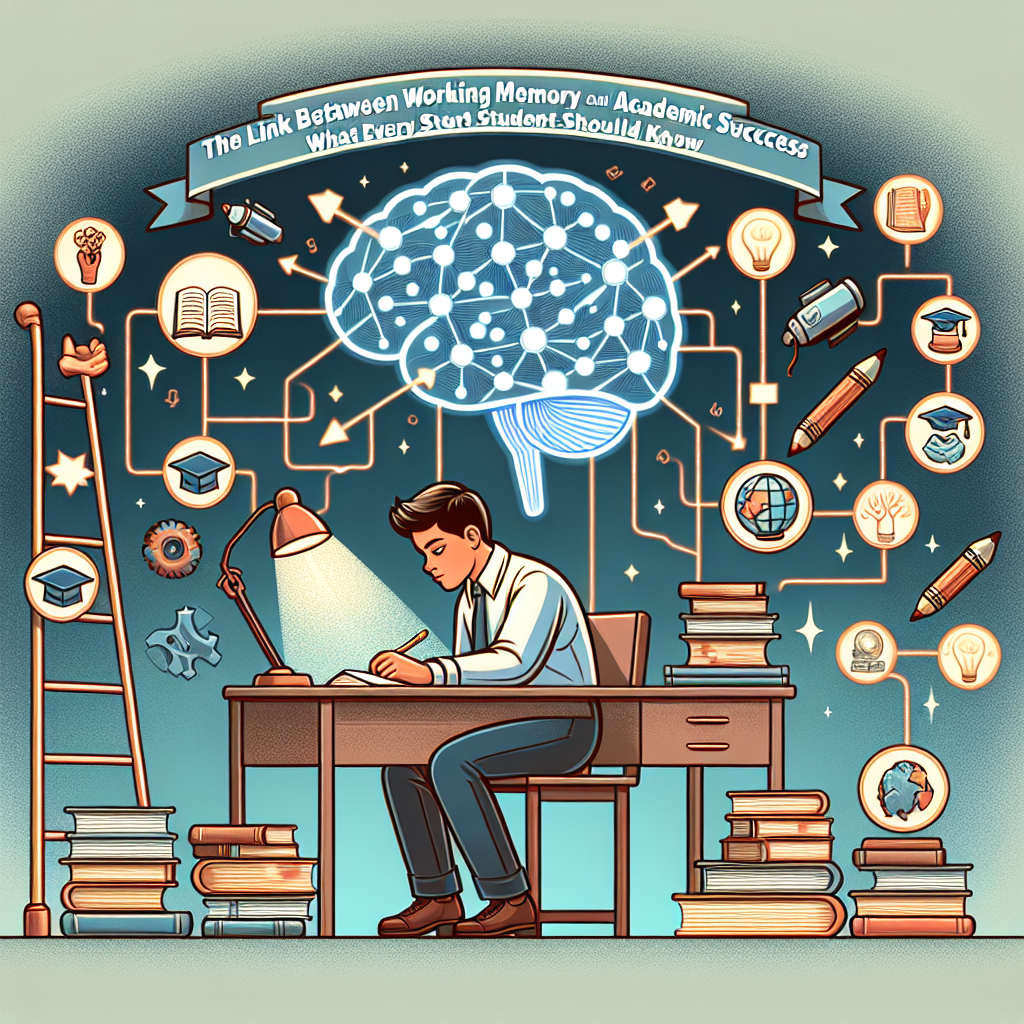Introduction
In today’s fast-paced educational environment, students are constantly bombarded with information. Between lectures, textbooks, and online resources, absorbing and retaining this knowledge can feel like a monumental task. Just how do some students excel while others struggle? The answer often lies in a cognitive function known as working memory.
Understanding The Link Between Working Memory and Academic Success: What Every Student Should Know is not just an academic exercise—it’s an essential component for mastering learning strategies. This guide will explore the intricate relationship between working memory and academic performance, giving students the tools they need to enhance their cognitive abilities and succeed in their educational endeavors.
What is Working Memory?
Working memory refers to the cognitive system responsible for temporarily holding and manipulating information. Unlike long-term memory, which stores information for extended periods, working memory is a dynamic workspace where we process current information. Think of it as a mental notepad where short-term tasks are managed, completed, and then discarded.
Components of Working Memory
Working memory consists of several components, notably:
- Central Executive: Acts as a control system that oversees the information flow.
- Visuo-spatial Sketchpad: Handles visual and spatial information.
- Phonological Loop: Manages auditory information.
- Episodic Buffer: Integrates information across domains and links it with long-term memory.
Understanding these components gives students a clearer perspective on how to leverage their working memory for academic success.
The Connection Between Working Memory and Academic Performance
Research Findings
Numerous studies illustrate the link between working memory capacity and academic success. For instance, a study published in the journal Psychological Science highlighted that students with higher working memory capacity performed better in math and reading tasks compared to their peers with lower capacity.
| Study | Key Findings |
|---|---|
| Gathercole et al. (2004) | Students with strong working memory showed improved overall academic performance. |
| Alloway & Alloway (2010) | Working memory training positively impacted students’ math and literacy skills. |
These studies underscore the academic advantages for students who harness their working memory effectively.
Real-World Applications: Case Studies
Case Study 1: The Impact of Working Memory Training
In a school district in the Midwest, students underwent a working memory training program that focused on enhancing their cognitive capabilities. Teachers reported substantial improvements in students’ grades and overall confidence levels. This case demonstrates The Link Between Working Memory and Academic Success: What Every Student Should Know, as enhanced cognitive functions led to tangible academic improvements.
Analysis: This study reinforces the importance of targeted training in enhancing working memory and the subsequent academic benefits.
Case Study 2: High Achievers and Working Memory
Another fascinating case comes from a group of high-achieving students at a prestigious high school. When compared with average performers, these high achievers exhibited significantly better scores on working memory assessment tests. This correlation suggests that a robust working memory could serve as an indicator of academic potential.
Analysis: Providing insight into the cognitive profiles of successful students, this study emphasizes the need for interventions aimed at boosting working memory amongst all students.
Strategies to Enhance Working Memory
1. Mind Mapping
One effective technique involves creating mind maps. This visual representation of information can help students organize their thoughts and improve their retention and recall.
2. Chunking Information
Chunking information into smaller, manageable pieces makes it easier to remember. For example, instead of trying to memorize a long list of items, students can group them into categories.
3. Dual Coding
This strategy combines verbal and visual information, allowing students to create stronger memory associations. By pairing images with text, learners enhance their understanding and recall.
4. Regular Breaks
Cognitive overload can impair working memory. Taking regular breaks during study sessions allows the brain to process information more effectively.
5. Practice and Repetition
Reinforcing learned material through quizzes, discussions, or practice problems can significantly improve working memory retention.
The Role of Teaching Methods
Modern Pedagogical Approaches
- Active Learning: Focuses on engaging students more directly in the learning process, thereby improving working memory function.
- Collaborative Learning: Encourages group work where peers can help each other remember information.
- Technology in the Classroom: Digital tools that incorporate gamification can make learning more engaging and efficient—supporting better working memory utilization.
The Importance of a Balanced Lifestyle
Physical Health
Maintaining a healthy lifestyle, including adequate sleep, nutrition, and exercise, is crucial for effective cognitive function. Research shows that sleep deprivation negatively affects working memory, while exercise can boost cognitive flexibility.
Mental Well-being
Stress management techniques such as mindfulness or meditation can help alleviate anxiety, creating a more conducive environment for learning.
Conclusion
In summary, understanding The Link Between Working Memory and Academic Success: What Every Student Should Know is crucial for any student looking to thrive in academics. By recognizing the components of working memory and employing effective strategies, students can significantly enhance their cognitive capabilities.
Make a commitment today: invest in your working memory, and you will unlock a world of academic opportunity.
FAQs
1. What is working memory?
Working memory is a cognitive system that temporarily holds and manipulates information essential for learning, problem-solving, and decision-making.
2. How can I improve my working memory?
You can improve your working memory through various strategies such as mind mapping, chunking information, practicing dual coding, taking regular breaks, and engaging in repetition.
3. Does working memory affect test scores?
Yes, numerous studies link higher working memory capacity with better academic performance, including higher test scores.
4. Can working memory training help all students?
While working memory training has shown positive results in many studies, individual results can vary. However, such training generally benefits students, especially those struggling in academic settings.
5. Is there a difference between working memory and short-term memory?
Yes, short-term memory involves temporarily holding information, while working memory also includes the manipulation and processing of that information for tasks and problem-solving.
By taking actionable steps toward developing your working memory, you set the stage for academic excellence and a brighter future.

